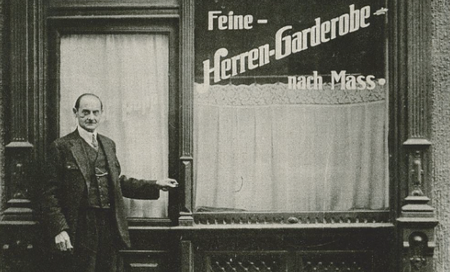A University of Aberdeen historian has gained new testimony which sheds light on Hitler's time as a struggling artist in Munich and uncovered previously unseen letters which provide insights into the psyche of a Nazi SS leader.
Professor Thomas Weber, who has previously made key discoveries about Hitler’s First World War service, says we assume ‘everything there is to know about this terrible period of history has already been uncovered’ but that surprise findings and the passage of time are opening up key new understanding about what drove leading Nazi perpetrators and how they drove others.
Weber is the first researcher to speak to a key member of the Popp family. Josef and Anna Popp let Hitler a room above their Munich tailor shop from his arrival in the city in 1913 until he enlisted for service in the First World War. The wartime letters and postcards Hitler sent to the Popps from the front account for most of his surviving reflections about the world that were not meant for public consumption.
Their great granddaughter Michelle McKane decided to speak to Professor Weber at her home in the USA as she feels a civic duty to ensure the family testimony survives.
She shared details of the conversations Hitler had with Popp snr on the floor of his tailor’s shop which Professor Weber says indicate that he ‘put his personal interactions with Jews in unfairness and injustice frames, blaming his own shortcomings as an artist on Jews’.
Professor Weber added: “There is absolutely no evidence that would support the idea that anyone other than Hitler himself was responsible for his failings.
“Hitler appears to have done so, not because Jews objectively speaking treated him unfairly, but because Hitler latched onto stereotypes and narratives about Jews that had been around for hundreds of years. He did so to make sense of his own failure and projected them onto the Jews whom he personally had encountered.
“According to Michelle McKane, Hitler would tell her great grandfather that Jews ‘were cheap’ and that he would complain that even though ‘he was an amazing artist’ he wasn’t selling his paintings and that when Jews ‘would come up to him to try to buy [his paintings], they were wanting to pay less of a price than he wanted them to pay’. McKane reported that Hitler told Josef Popp: ‘They're just trying to take advantage of me. You know, all the Jewish population wants to take advantage of, you know, other people. It's all for them and not for me’.”
Professor Weber has also discovered seven previously unseen letters by Hanns Albin Rauter – the highest SS and Police Leader in the occupied Netherlands – written during his trial to his wife and father-in-law, which were among a large collection of private materials acquired by the Hoover Institution at Stanford University in the US, where Professor Weber is a fellow.
Rauter was responsible for the fight against the resistance, the deployment of Dutch citizens as forced labourers in Germany and the deportation of Dutch Jews to death camps.
Professor Weber says the letters written from his prison cell in Scheveningen, where he was on trial for committing war crimes in 1948, reveal ‘the psyche of one of the most notorious Nazi war criminals’.
Professor Weber added: Rauter wrote in one letter ‘I don't believe I will be the accused at the end of the trial’ and claimed that the measures he took during the occupation – including taking hostages and executing resistance fighters – ‘remained well within the limits of what international law allows me to do’.
“To his wife, he admitted to all his deeds – curiously with the exception of his role in the Holocaust. He presented himself to his family as a man of virtue: as someone who simultaneously was a true believer in National Socialism and who abided by universal norms of warfare.
“After reading reports of the trial in the Dutch media he wrote that they had ‘been too sharp, sometimes even brutal’ claiming instead that ‘people see me as the personification and incarnation of the annoying big Germany that had attacked the small, peaceful Holland’. He said he was prepared to die, so that the Dutch and the Germans could move on and find ways of dealing with each other again.
Professor Weber, who uses the new testimony and evidence in the online University of Aberdeen short course, Hitler, which is open to students around the world, says in a more divided world, understanding what motivates people to faithfully follow radical ideas, and to inspire others to do the same is increasingly important. “Understanding how, in the past, rational people appropriated detrimental and extremist views and as a result engaged in harmful behaviour towards others helps us to put into sharper focus similar processes in our own world.”


